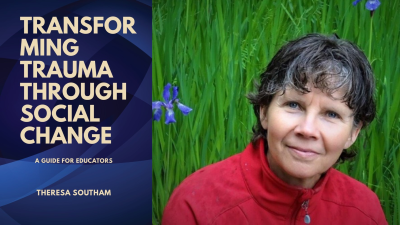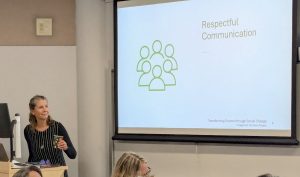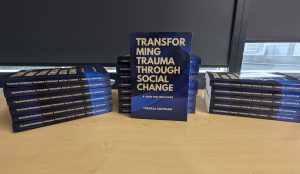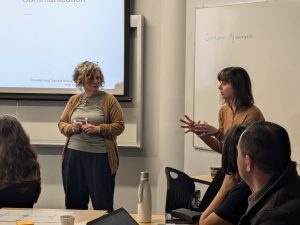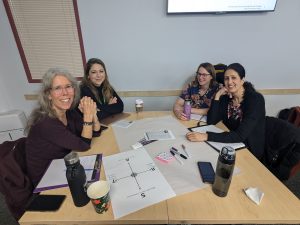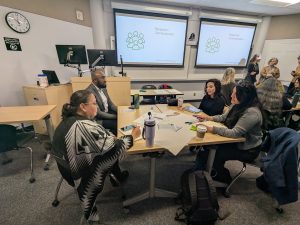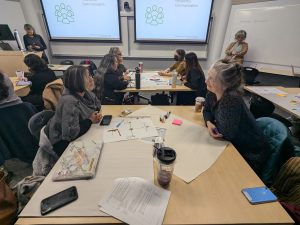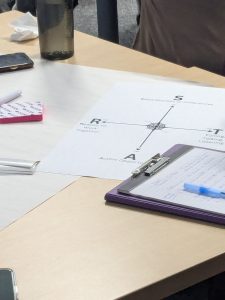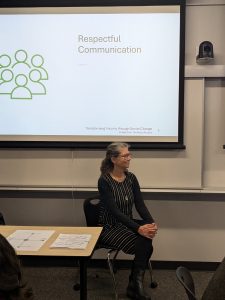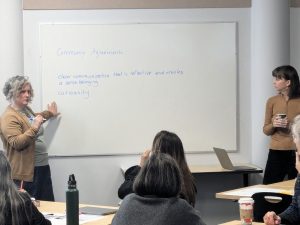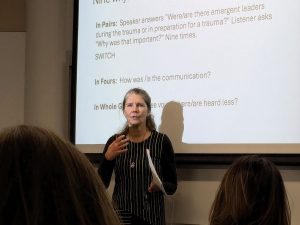Written by Victoria Surtees, Internationalization Specialist.
On November 15th, I attended a full-day event on Trauma-Informed Teaching Practices, with special guest, Dr. Theresa Southam, author of Transforming Trauma Through Social Change: A Guide for educators. Co-hosted by Dr. Amea Wilbur, Dr. Brianna Strumm, and UFV’s Teaching and Learning Centre, the day’s events covered an applied workshop in the morning, followed by the inaugural meeting of a BC network of trauma-informed educators in the afternoon.
I was excited and a bit nervous. After all, we were going to talk about TRAUMA. Wouldn’t that be emotional? Difficult? Draining? Well, it was indeed emotional… but in that good way where you feel connected to and uplifted by others. It was a space where we could bring the concerns we’ve been seeing with students and colleagues into the open and explore opportunities. Dr. Southam’s calm and caring presence grounded our work, as she expertly guided us to think about post-traumatic growth and how we can support our community in collectively moving toward transformative action.
How is trauma mattering in our classrooms?
Whether it’s the impacts of the pandemic, climate change, or residential schools, there is no doubt we are collectively experiencing trauma in ways that impact teaching and learning. We know there has been a significant rise in reported mental health challenges amongst our students. Students are less able to handle uncertainty, they are checked out, they are anxious, or preoccupied. The need for trauma-informed teaching practices was felt by many in attendance at the event.
Focussing on collective growth and resilience
When we talk about trauma, we so often focus on the hurt and the negative impacts. Dr. Southam’s book breaks that cycle by focussing on healing through gratitude and collective action. She shared powerful stories of activities and structures that she and others have used to support communities and students in making sense of their experiences and identifying opportunities for action. For example, using Liberating structures, such as the Nine Whys and the Generative Relationships STAR, we reflected together on the values that underpin our and our community’s drive to transform trauma into positive social change and to explore tools for identifying barriers and enabling factors. As participants completed these deeply relational and impactful activities, many shared words like reflective, inspired, and supported.
Building a network of trauma-informed educators
While interest in trauma-informed teaching is growing, in a study of educators’ experiences, Dr. Strumm and Dr. Wilbur, found that many feel isolated in their units or institutions and are looking for support. In response to their findings, the afternoon was dedicated to gauging interest in a network of educators interested in trauma-informed practices. Dr. Southam shared insights from her book and faculty and staff from institutions across BC shared their investment in trauma-informed practice and their desire to learn, connect, and support each other.
The event was hopeful, joyful, and practical – there is no doubt that Dr. Southam’s activities for transforming trauma are a very practical application of changemaking values and principles. I look forward to trying them out in my own classrooms!
If you are interested in joining a BC-based network on trauma-informed pedagogy and practice, please contact Brianna Strumm at brianna.strumm@ufv.ca.

